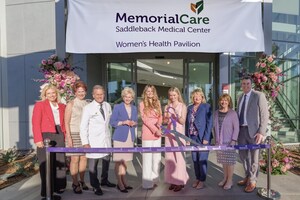MemorialCare Saddleback Medical Center Cutting-Edge Heart Care: Less Invasive Heart Procedure Option and Pacemaker Size of a Vitamin
LAGUNA HILLS, Calif., March 1, 2018 /PRNewswire-USNewswire/ -- MemorialCare Saddleback Medical Center continues its leadership in advanced heart procedures with new offerings.
The first advancement, transcatheter aortic value replacement (TAVR), is a minimally invasive procedure for select patients diagnosed with severe narrowing of the aortic heart valve who may not be candidates for traditional open heart surgery.
The second involves the world's smallest pacemaker for patients with irregular or too slow heartbeats. One-tenth the size of traditional pacemakers, the Micra Transcatheter Pacing System (TPS) regulates beating of the heart through electric signals.
Patients who may be eligible for the TAVR procedure have symptomatic severe aortic stenosis caused by calcium buildup on the aortic valve flaps that open and close to allow blood to pass from the heart to the rest of the body. As one ages, calcium build up can restrict normal blood flow through the valve, making the heart work harder than normal. Severe aortic stenosis symptoms include shortness of breath, fatigue, chest pain, swollen ankles and feet, lightheadedness and dizziness. Diagnostic procedures ordered by the patient's physician help determine presence and severity of aortic stenosis.
Patients at intermediate or greater risk for severe aortic stenosis may be referred to Saddleback Medical Center's specially trained cardiologists and surgeons to further assess and determine if TAVR or another procedure is preferred.
"With TAVR, a new heart valve is inserted directly within the diseased aortic valve through a small incision in the groin," explains Michael Gault, M.D., Medical Director of Cardiology at Saddleback Medical Center. "Other approaches include either insertion via the subclavicular area, the chest between the ribs or the upper chest. Once in place, the new valve begins to work immediately. Total procedure time is one to two hours."
The revolutionary new pacemaker focuses on patients with atrial fibrillation when the heart's two upper chambers are not in sync and beat irregularly, or for those with bradycardia where the heart beats too slow, preventing it from pumping enough blood to the body during normal activity. Symptoms for both conditions include weakness, shortness of breath and fatigue.
"Millions of people are affected by atrial fibrillation every year," says Paul Drury, M.D., Associate Medical Director of Electrophysiology at Saddleback Medical Center. "You can sometimes treat the condition with medication, however in some cases a pacemaker is needed and can now be inserted using a minimally invasive approach."
The size of a large vitamin and weighing less than a penny, the pacemaker is small enough to be inserted through a hollow tube called a catheter with a small incision in the groin. Once inserted, the device starts working to return the heart to a regular rhythm immediately. Procedure time is about one hour. Most patients return home the same day with recovery lasting one to two weeks.
The pacemaker's battery life is about 12 years. Its unique design enables it to be permanently turned off so it can remain in the body and a new device implanted without risk of electrical interaction for patients needing more than one pacemaker. The pacemaker is wireless, so there is no need for leads or wires that send electrical impulses to keep the heart beating.
MemorialCare Saddleback Medical Center is listed frequently among America's Best Hospitals, Best of Orange County Hospitals and in several clinical areas, including Truven Health Analytics Top 50 U.S. Cardiovascular Hospitals and American Heart Association's Gold Plus for quality achievements in Cardiac and Stroke Care. Centers of excellence include cancer, heart disease, pulmonary disease, orthopedics, spine care, diabetes, neurology, neurosurgery, gastroenterology, emergency and critical care medicine, breast health, imaging, women's health, geriatric care and minimally invasive and robotic surgery. The Women's Hospital at Saddleback Medical Center offers personalized obstetrics, a highly regarded perinatal program, and neonatal intensive care unit. Recent U.S. News & World Report high-performance rankings include Heart Failure and Colon Cancer Surgery. It is part of MemorialCare, a Southern California nonprofit integrated delivery system including five hospitals, more than 200 care locations, MemorialCare Medical Group and Greater Newport Physicians. Visit https://www.memorialcare.org/TAVR and www.memorialcare.org/sbheart.
SOURCE MemorialCare Saddleback Medical Center
WANT YOUR COMPANY'S NEWS FEATURED ON PRNEWSWIRE.COM?
Newsrooms &
Influencers
Digital Media
Outlets
Journalists
Opted In





Share this article